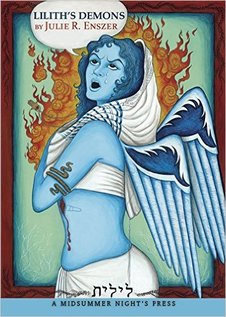Lilith. Feminist icon. Biblical nightmare. And now, the subject of Julie R. Enszer’s latest poetry book. Lilith’s Demons, Enszer’s third book, reimagines the infamous, ancient figure Lilith as a modern, empowered woman. Split into three parts, the book begins with poems from Lilith’s point of view, followed by a middle section narrated by her demons (all with their own unique name and personality), and finally, closing with a short section narrated by angels who are drawn to Lilith’s alluring power. Through the eyes of Lilith and her demons, Enszer crafts a beautiful and thought-provoking narrative of the modern issue of women’s oppression, and the punishment they receive. Lilith is a character that reaches out from the page and ensnares the reader almost instantly. Enszer penned Lilith’s stanzas in such a lyrical and beautiful way, that even as she (and her demons) blatantly told the reader that she requires human death and suffering (especially that of women) to continue to live, I, the reader, was drawn to her confidence and the power of the language she used. In the poem entitled “Dusk,” Lilith even boasts of humans: “They invoke me; they fear me; they adore me,” describing not only Lilith’s mimetic interactions with humans but of readers’ interactions with Enszer’s poetry.
It stands out as strange that Lilith, a powerful female figure, would require the suffering of women in order to live. However, Enszer creates a reason so effortlessly it is accepted immediately by the reader: “Lilith despises disloyalty/ within the tribe of women.” So simple, yet so powerful. Lilith is not punishing women for being women, as a patriarchal system does, rather she punishes women who betray other women, thus adding to the system of oppression. Lilith’s Demons is a call to action to all women from Enszer herself: united, women possess the power of Lilith, strong, independent, brutal, yet still with a capacity for love and compassion. Lilith is powerful, yes, but she still displays a humanity that is usually absent from her legends. She speaks of her demons with a deeply felt adoration, saying “I name them / as they seep / from my body. Whispering their names, I bring them into being.” She is not a cold, heartless being, who names those that are born from her. She is a figure capable of love. An angel, “Senoy,” also describes Lilith of being capable of love affairs, even with angels: “She loves her and / Lilith loves Semangelof. The mother of demons. An angel. Queer pair.” So Lilith’s Demons is not only a spectacular retelling of the ancient story of Lilith and her curse to bear one hundred demons every night. Lilith’s Demons is a plea, from one powerful woman to all women, to embrace their inner power, and to spread that power, along with compassion, among the “tribe” of women. Enszer inspires a sense of community within her readers, as having Lilith ever present, looming as a figure of the all-powerful woman and the brutality of the consequences women face when they turn against one another.
0 Comments
Leave a Reply. |
Archives
April 2024
Categories
All
|
|
Glassworks is a publication of Rowan University's Master of Arts in Writing 260 Victoria Street • Glassboro, New Jersey 08028 glassworksmagazine@rowan.edu |
All Content on this Site (c) 2024 Glassworks
|


 RSS Feed
RSS Feed
